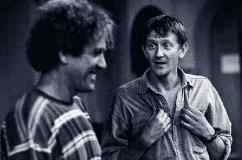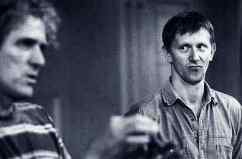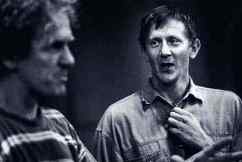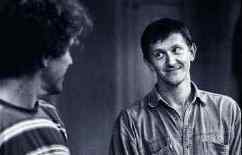

![]()

In August 1997 Jos Houben and Micheline Vandepoel ran a workshop on humour for a diverse group of twenty individual performers - professional actors, creators and producers of original comedic theatrical productions.
In Search of Stability
'If I go to the news-stand- I pay my money, the vendor gives me my
change, I take the newspaper -and no one laughs. This is because the code
is understood and followed.'
| According to Jos Houben we laugh to stabilise an unstable situation. Before we can construct instability, however, we need to understand and analyse stability. The backbone of the week’s physical and theoretical exploration were the words of Moshe Feldenkrais: 'When you know what you do, you can do what you want’. |  |
 |
Houben and Vanderpoel work with what is known as the neutral mask - a simple mask with a peaceful expression, designed to help find the universal in human behaviour. 'We need to discover how things should happen in an ideal world, to have a sense of what is right and wrong and how this is organised’. According to Jos Houben, in so doing, we become more aware of our subjectivity. `Because we've already lived for a while, life has formed us and without realising it we tell a story before we tell the story we want to tell. Just by the way we walk, stand, sit or turn our head. By becoming more aware of the story we already tell, we can tell the story we really want to tell more consciously.' |
 |
|
| Simple improvisations are set up
in search of stability and neutrality. One example might be a restaurant,
with a waiter and a customer. The objective is to play the obvious situation
according to the rules, conveying nothing more than the customer enters
a restaurant, the waiter offers a table, the customer sits down, the waiter
brings the menu, the customer makes his or her choice, the waiter goes
to the kitchen, etc. And no laughter must be elicited. In practice this
proves impossible. Within no time the group is rolling around with laughter.
The point is then to work out exactly what makes the group laugh. It soon
becomes apparent that nearly every word or movement tempts the actor away
from neutrality. The rules of the code are constantly being broken, with,
for example, the smallest hesitation, repetition, misunderstanding, or
unclear or superfluous gesture.
Organising Destabilisation |
|
| To realise this as a comedic actor, the player has to be in control of timing, build-up, movement, and gesture, making the character appear disorganised and ineffective. This in turn needs to be readable and reproducible. A piece of comedy, just like a painting, a piece of music, or a dance, needs organisation in order to exist. |  |
Lisa Sove is a theatre maker and performer
![]()